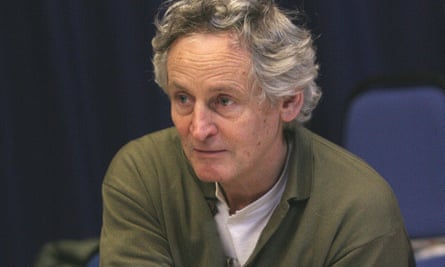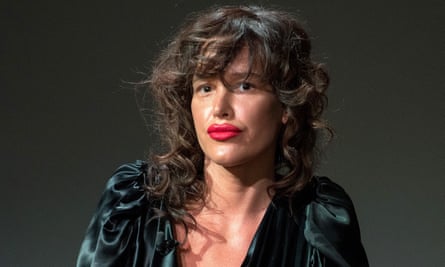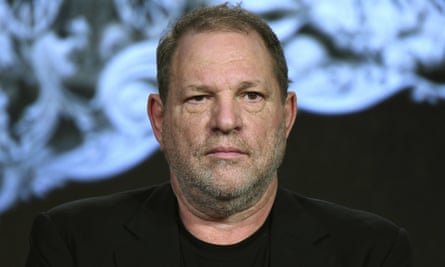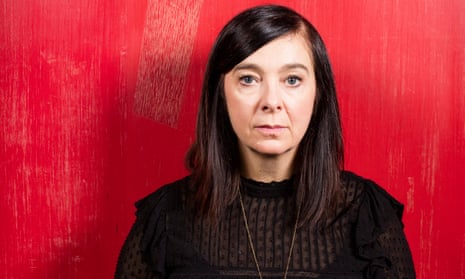Vicky Featherstone is joking, I think, when she says she considered beginning the Royal Court theatre’s new code of behaviour with the straightforward guideline: “Don’t be a pervert.”
“I thought that would probably be a bit extreme,” she grins. “Because it’s so complex. But then, it’s also actually not that complicated at all. Actually, it’s a very simple situation. It literally is just: stop it. If they stop it, it’s all gone.”
Since the Harvey Weinstein story broke, the Royal Court’s artistic director has offered us a masterclass in how to channel fury about a frighteningly big problem into focused action. On 11 October, reeling from the first revelations about the Hollywood producer, Featherstone tweeted: “Hollywood can speak out, British theatre must too. I have a responsibility as do many of you to end the abuses of power in our industry. Thoughts on what I/we should do?” A plan came together within days. The Royal Court invited members of the industry to submit their experiences of sexual abuse of power, and staged an event, billed No Grey Area, last Saturday, where 150 testimonies were read out over five hours to an audience of actors, directors, drama students and industry body representatives. Since then Featherstone and her team have been flat out drawing up a code of behaviour, which they released late yesterday.

“The guidelines are inconclusive and they’re fast, but I’m not going to be scared about that. Straight away people will go, ‘Oh well, this isn’t in there, or what does that mean?’, but actually we just have to get something to happen, otherwise we never do anything. It’s very difficult to make change happen if you try to reach a consensus about how to do that. Sometimes it’s a bit easier for someone to go a bit rogue, and be a bit maverick to start the ball rolling. We can move really quickly here, and we have an amazing team, and we’re really political, so we can do all this. I’m saying this is what we’ve learned, this is my offering, and we can all use it how we want to.”
When we meet at 8pm on Thursday, Featherstone has been at work since 5.30am. She has a new play opening, but is consumed by the urgency of the sexual harassment scandal, and as she talks, I find myself thinking of all the women who have ever wondered if it’s possible to express anger without being dismissed as shrill and over-emotional. I wish they could see Featherstone now, fizzing with unapologetically purposeful energy.
“The reason I’m so angry is I’m so shocked that we’d got to this point and we’d all accepted it. We all knew about it! We. All. Knew.” What exactly did she know a month ago? “I knew that pretty much every single woman I know had suffered sexual harassment in her life. I knew that, and I’d just accepted that. I’m hardwired to accept it. I’m a feminist, and when I talk about it, it shocks me. But I had literally accepted it, like I accept that we have a class system. I’d accepted it like I accept that there are homeless people. And that’s just bizarre – but it’s what we’ve done. And then suddenly someone speaks out, and you start to think, why are we as a society accepting of this situation?”

Before the Weinstein story broke, “We felt it was outrageous that this code of behaviour was accepted, but that if you didn’t behave like that then you were making a stand. If it doesn’t happen in my rehearsal rooms, or in my theatre, then therefore I’m all right. But the Harvey Weinstein thing has clarified that all of us have to stand together, and I think that’s a shift. Now we’re saying we’ve got to support those individuals.” Her eyes widen. “I just can’t believe that we’ve all colluded.”
Isn’t it more that we were defeatist than complicit? “That’s exactly right. And now I don’t feel defeatist or defeated any more.”
Featherstone fully expects more names to emerge as more women feel emboldened to speak out. What would her advice be to men who know they are guilty; should they apologise privately to the people they have mistreated? “Oh God, I don’t know.” Or put their hand up publicly and say: “I think I might have been part of the problem here”? “But then people might start feeling sorry for them.” Her gaze drops for a moment, before she looks up to meet mine squarely. “You know, I’m so angry with them, I don’t care what they do. I’m just so angry.”
I’m curious to know if she thinks men who have abused their power in her profession are now quaking in their boots, or in such denial that they literally do not recognise their own behaviour. “It’s a fascinating question.” At the risk of sounding credulous, I say, Kevin Spacey and Max Stafford-Clark’s statements looked to me like the responses of men who had been systematically lying to themselves for years.
“I feel they must have been lying to themselves, otherwise how can they live with what they’ve done? I hope that’s true. In a way. No, do I think that?” She pauses. “There will be some [who’ve abused their power] who are sitting on their sofas thinking, ‘Oh fuck, they’re going to come and get me’, and there will be others who have no idea. Though I don’t know how that can be the case. It’s bewildering beyond belief.”

Featherstone’s husband, “who is a very brilliant alpha male”, has told her: “Every single man knows exactly what they’re doing with every single interaction with a woman. They’re just lying if they claim they don’t. I’ve known since I was a teenager what every single interaction with a woman means. I know when I’m paying her a compliment sexually or not. You absolutely know.’” When she suggested to her 18-year-old son that perhaps these men had been delusional, his response was equally emphatic. “No, they are not. I absolutely know when I’m being platonic and when I’m not. Of course I know.”
She finds it very hard to see how patterns of behaviour that emerged from submissions to the No Grey Area day can be explained away as genuine confusion over blurred boundaries. “It’s so blatant. Things such as a director literally saying, ‘If you sleep with me, I will give you this job’. It’s extraordinary.” It’s equally hard for her to see how a man who knows a young woman has consented to sex through gritted teeth can really be motivated by uncontrollable sexual desire. “That’s this whole thing, isn’t it, about whether this is sexual or about power. Because I cannot understand that any of those actions are remotely titillating. But obviously to those people who do that, it’s quite exciting.” She shakes her head. “Once you start to have this conversation, I actually can’t understand it. Once you start to break it down into what do they get from doing it, and what is in their head, I literally melt.”
Featherstone credits her feminist education at Manchester university in the 1980s with “tooling me up” to call men out whenever they tried to abuse their power over her. “If people are able to be tooled up – to not succumb to the shame, but to immediately feel that they have the right to say: ‘That’s not appropriate, you make me feel uncomfortable’ – the thing can stop earlier. I’ve been lucky enough to have that tool, and I think it’s why I’ve been able to do this. I’m angry on behalf of everybody, but I’m not carrying a great injustice done to myself. I think that’s one of the things that’s making me feel quite fearless about doing this.”
One of the changes she is calling for is an end to the confidentiality agreements that protect men disciplined or dismissed for sexual misconduct. “Confidentiality around complaints procedures is actually perpetuating shame, and protecting the perpetrator, and I’m sick of that. Actually, people should go: ‘I’m telling everyone this thing that happened to me because actually I’ve got nothing to lose.’ And the other problem is that confidentiality agreements stop us being able to recognise the patterns of behaviour or the people who keep doing it.”
A striking theme to emerge from the No Grey Area submissions was the Weinstein-esque tactic of inviting young women to meet late at night, on the pretext of discussing a role or job. “I’d had no idea it was such a pattern.” Featherstone wants to make it clear that her new code does not prohibit colleagues discussing work over a drink at the end of the day. “I’ve been misquoted on that, and it is not correct. But if a young assistant director or drama student is rung up by some magnificently successful grown-up director, and invited to dinner at his house, it’s only going to feel like a compliment – when, in fact, it’s grooming.”
Another pattern is the practice of making a young actress audition for a part by playing a romantic or sex scene. The actor Sarah Solemani wrote about this recently, pointing out that “the laws of improv are diametrically opposed to the laws of consent; improv needing a, ‘Yes, let’s’ and not able to do much with a, ‘No, thanks, get your hands off me’.”
Featherstone agrees: “An actress can feel like she has to prove that she can take a risk and that she’s up for it. That she’s not prudish and that she’s fearless. But how is someone protected in that environment to say I’m really not comfortable?” She is calling on casting agents to ban sex scenes from auditions. “Because they’re not really about proving that you’re fearless or can take risks at all.”
But at the very top of her list of guidelines – and her ultimate solution – is a call for men to take responsibility for their actions. “I don’t think they have ever been asked to do that before. So I’m hoping that by the questions being asked, people are going to have to start looking at themselves differently. You asked, what should men [who know they have abused their power] do? I genuinely don’t know what the answer to that is. From our day of action, some people said there should be room for learning. And I know that the good side of me should believe in that. But I’m not sure where it takes place or what it means.”
Or even if they genuinely need it?
“No. They just need to stop doing it. Because now they’re going to be called out. And now they won’t be able to get away with it.”
